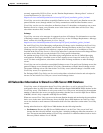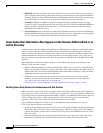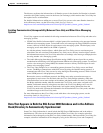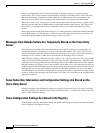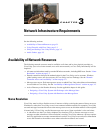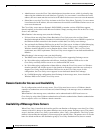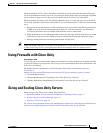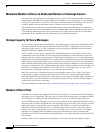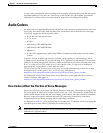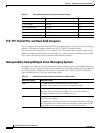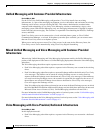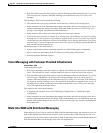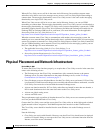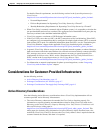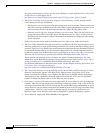
3-5
Design Guide for Cisco Unity Release 5.x
OL-14619-01
Chapter 3 Network Infrastructure Requirements
Audio Codecs
In some cases you might find that an existing voice messaging system has more ports than the current
maximum number of voice ports on a Cisco
Unity system. In this case, the customer can purchase
additional Cisco
Unity servers and connect them by using Cisco Unity Digital Networking.
Audio Codecs
An audio codec is an algorithm that encodes and decodes (and compresses or decompresses) audio data.
Cisco
Unity uses audio codecs with streaming (live conversation) and for WAV-file voice messages.
Cisco
Unity supports the following audio codecs:
• G.711 Mu-Law (the default codec)
• G.711 A-Law
• G.729a
• Intel Dialogic OKI ADPCM 8 kHz
• Intel Dialogic OKI ADPCM 6 kHz
• GSM 6.10
• G.726 codec (supported only when using VPIM to communicate with another voice-messaging
system)
In general, choose an audio codec based on available storage capacity for voice messages and on
available network bandwidth. We recommend using G.711 whenever possible because of its excellent
quality for recording and playback. However, if other considerations prevent the customer from using
G.711, it is fine to use G.729a, which is also a voice-quality codec. (A large-scale or multiserver
deployment may require the use of more than one codec.)
The rest of this section discusses some of the issues to consider when choosing a codec. For a more
thorough analysis, see the Audio Codecs and Cisco
Unity white paper at
http://www.cisco.com/en/US/products/sw/voicesw/ps2237/prod_white_papers_list.html.
For information on how codec choice affects Active Directory, see the applicable Active Directory
Capacity Planning white paper at
http://www.cisco.com/en/US/products/sw/voicesw/ps2237/prod_white_papers_list.html.
How Codecs Affect the File Size of Voice Messages
Stored voice messages can consume considerable amounts of disk space. The amount of storage a WAV
file uses depends on what kind of compression the codec uses, if any. The higher the compression, the
smaller the file and the smaller the disk-space impact on the database and at the subscriber workstation.
However, some sound-quality reduction and some CPU processing overhead may result when
compressing messages during recording and decompressing at playback.
As illustrated in Table 3-1, voice messages that are recorded in G.711 Mu-Law and A-Law require the
most disk space to store, while G.729a offers the smallest file size.
Note Audio quality ratings are subjective, and are provided here only for basic comparison between the
different fully supported codecs.



